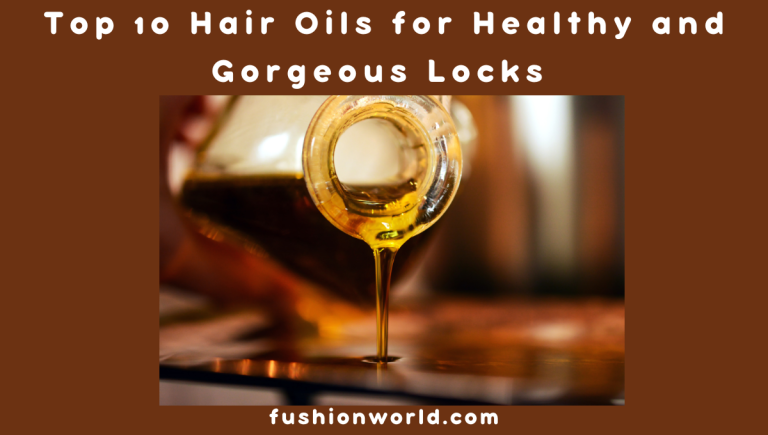Hair that is beautiful and healthy has always been a representation of youth and beauty. Even if the market is flooded with hair care products, hair oils have endured as one of the most reliable and adaptable ways to maintain and improve the health of your hair. Hair oils have been used for millennia in many different cultures to encourage hair growth, nourish the scalp, and give shine to locks. In this post, we’ll examine the top 10 hair oils that have become well-known for their outstanding advantages.
Coconut Oil
One of the most well-known and frequently used hair oils is, without a doubt, coconut oil. Due to its high fatty acid and vitamin content, it is a fantastic hair and scalp moisturizer. Deep hair shaft penetration by coconut oil reduces breakage and prevents protein loss. Additionally, it possesses antibacterial qualities that can aid in treating fungal infections and dandruff on the scalp.
Argan Oil
Argan oil, also referred to as “liquid gold,” is produced from the kernels of the Moroccan argan tree. It is brimming with fatty acids, vitamins, and antioxidants that strengthen hair, control frizz, and provide a bright shine. Argan oil is suitable for all hair types, including fine hair, as it is lightweight and non-greasy.
Castor Oil
Castor oil has grown in popularity because of its potential to encourage thicker, longer hair. Castor oil, which is high in ricinoleic acid, has anti-inflammatory qualities that can calm the scalp and increase blood flow. Castor oil can lengthen and strengthen hair strands by strengthening them regularly and preventing breakage.
Jojoba Oil
Jojoba oil is a great oil for balancing oil production since it closely resembles the natural sebum produced by our scalp. It is moisturizing, lightweight, and perfect for people with oily or mixed hair. In addition, jojoba oil has vitamins and minerals that nourish hair follicles and encourage strong hair development.
Olive Oil
A key ingredient in Mediterranean cooking, olive oil has many advantages for healthy hair. Vitamin E and antioxidants found in it are abundant, protecting hair from environmental harm and fostering a healthy scalp. Deep conditioning treatments with olive oil can leave hair silky, lustrous, and easier to manage.
Almond Oil

Because it contains a lot of proteins, vitamins, and minerals, almond oil is another superfood for hair maintenance. It creates a glossy sheen, strengthens hair, and lessens hair loss. Magnesium, which can help to reduce hair breakage and improve general hair health, is another ingredient in almond oil.
Rosemary Oil
The stimulating properties of rosemary oil on hair follicles are well documented and have been shown to promote hair growth. It strengthens the hair shaft and increases blood flow to the scalp, resulting in thicker, healthier hair. In addition, rosemary oil has antibacterial qualities that might aid with scalp problems like dandruff.
Lavender Oil
In addition to having a lovely scent, lavender oil has advantages for the health of the hair and scalp. It has been demonstrated to encourage relaxation and lessen tension, which may help to indirectly promote better hair. The antifungal and calming characteristics of lavender oil can treat dandruff and soothe an inflamed scalp, respectively.
Tea Tree Oil
The potent antifungal and antibacterial effects of tea tree oil are well known. It is frequently used on the scalp to treat eczema, psoriasis, and dandruff. Despite tea tree oil’s strength, it should only be used sparingly and in combination with a carrier oil to prevent skin sensitivity.
Grapeseed Oil
Lightweight grapeseed oil is a good source of vitamin E and other antioxidants. It provides hydration without leaving a greasy residue because it is easily absorbed by the hair and scalp. Hair can be strengthened, frizz is reduced, and heat damage from styling tools is protected using grapeseed oil.
Incorporating Hair Oils into Your Routine:
While these top 10 hair oils offer a wide range of benefits, it’s essential to use them correctly to achieve the best results. Here’s how you can incorporate hair oils into your hair care routine:
Choose the Best Oil for Your Hair Type:
Each type of hair has various requirements. While jojoba and grapeseed oils are preferable for fine or greasy hair, coconut, and argan oils are adaptable and suited for most hair types.
Perform a Patch Test:
To check for allergic reactions or irritation, perform a patch test before applying any new oil to your scalp. Wait 24 hours after applying a small amount of diluted oil on your wrist or behind your ear.
Massage Your Scalp:
Use your fingertips to gently massage the oil into your scalp to increase circulation and achieve a uniform distribution. It also promotes relaxation and reduces tension.
Warm the Oil:
Warm oil can better penetrate the hair shaft. Before using, you can warm the oil by briefly submerging the container in warm water.
Use as a Treatment: Hair oils can be applied as leave-in conditioners or as pre-shampoo treatments. Focusing on the ends and scalp, apply the oil to your hair and let it sit for a predetermined amount of time before rinsing it out.
Be Consistent:
While there are some noticeable advantages right away, the true transformation takes place with regular use over time. For optimal results, add hair oils to your routine a couple of times per week.
Avoid Overuse:
While using hair oils frequently can make your hair oily or weigh it down, they are useful. Use a small amount and adjust in accordance with how your hair reacts.
Here are some FAQs:
Q: Can I use hair oils on all hair types?
A: Yes, many hair oils are suitable for various hair types. Coconut and argan oils are versatile and work well for most hair textures, while lighter oils like jojoba and grapeseed are better for fine or oily hair.
Q: How often should I apply hair oil?
A: The frequency of application depends on your hair’s needs. Generally, using hair oil 2-3 times a week as a pre-shampoo treatment or leave-in conditioner can yield positive results.
Q: Can hair oils help with hair loss?
A: Some hair oils, like castor oil, contain nutrients that promote hair growth and thickness. However, results vary, and it’s important to address the underlying causes of hair loss in conjunction with using hair oils.
Q: Can I leave hair oil on overnight?
A: Leaving hair oil on overnight can provide deeper nourishment. However, ensure that you wrap your hair in a cloth or use a towel on your pillow to avoid staining. Also, be cautious with oils that may attract dust or cause skin irritation.
Q: How do I choose the right hair oil for my scalp condition?
A: For scalp issues like dandruff or itchiness, tea tree oil, rosemary oil, or neem oil can be beneficial due to their antifungal properties. Always dilute essential oils with a carrier oil before use to prevent irritation.
Q: Can hair oils cause hair to fall out if used excessively?
A: Overuse of hair oils can weigh down hair and make it appear greasy, but it’s unlikely to cause hair to fall out. However, using oil excessively without proper cleansing may contribute to buildup on the scalp.
Q: Can hair oils replace regular conditioners?
A: Hair oils can serve as deep conditioning treatments, but they might not completely replace regular conditioners. They provide intense hydration, while conditioners focus on detangling and smoothing the hair’s surface.
Q: Is it safe to use essential oils directly on the scalp?
A: Essential oils are potent and should not be applied directly to the scalp. Always dilute essential oils in a carrier oil like coconut or jojoba oil before applying to avoid irritation.
Q: Can hair oils protect hair from heat styling?
A: Some hair oils, like grapeseed oil, can provide a certain degree of heat protection by forming a barrier between the hair and styling tools. However, dedicated heat protectants are more effective for this purpose.
Q: Can hair oils help with split ends?
A: Hair oils can temporarily minimize the appearance of split ends by smoothing the hair shaft, but they cannot repair or permanently seal split ends. Regular trims are essential to prevent split ends from worsening.
Remember that individual experiences with hair oils may vary, and it’s a good idea to do a patch test before trying a new oil to ensure that you don’t have any adverse reactions. If you have specific hair concerns, consulting with a dermatologist or a hair care professional can provide personalized guidance.
Conclusion:
Hair oils have been cherished for centuries for their ability to transform dull, damaged hair into luscious, vibrant locks. The top 10 hair oils mentioned in this article offer a variety of benefits, from promoting hair growth and thickness to nourishing the scalp and adding shine. By understanding your hair type and needs, you can choose the right oil and incorporate it into your hair care routine for optimal results. Whether you’re seeking to tackle specific hair issues or simply enhance your hair’s natural beauty, the power of these oils can unlock the secret to healthier, more gorgeous locks.

